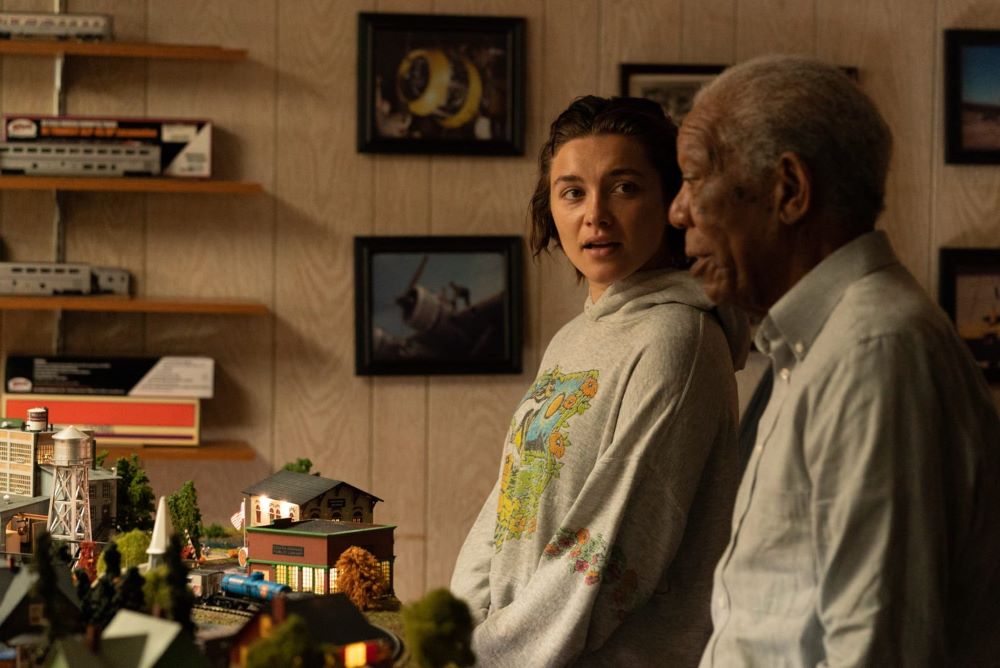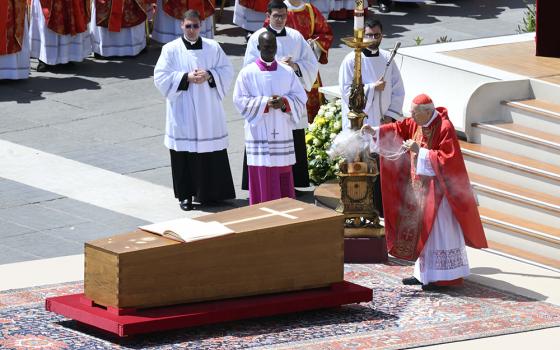
Allison (Florence Pugh) and Daniel (Morgan Freeman) build an unlikely friendship in MGM's "A Good Person." (MGM/Jeong Park)
What's the difference between giving someone the help we think they need and the help they actually need?
Zach Braff's new film, starring Florence Pugh and Morgan Freeman, acknowledges that there is no black-and-white answer to this question. Instead, "A Good Person" holds the audience captive in shades of gray tension before exploding into a kaleidoscope of redemption arcs that, woven together, might just make a rainbow.
If its Jersey setting wasn't enough of a clue that this will be a heavy film, "A Good Person" promises disaster by opening with a peace so saccharine that it must mean something awful is coming. The first few scenes give the audience a glimpse into the bliss that is Allison (Pugh) and Nathan's (Chinaza Uche) relationship — fresh engagement and all — and has viewers waiting with bated breath for the inevitable tragedy that makes movies like this so painful and so important.
A warning, dear reader: That proverbial other shoe falls with such force, it may feel like it has stomped right on the seat in which you sit.
While driving Nathan's sister and brother-in-law into Manhattan for her wedding dress fitting, Allison checks the map on her phone. Her glance down was brief, but it was enough to cause an accident that would kill both her future sister- and brother-in-law. The next thing we see is Allison waking up in the hospital with a head injury, finding out about the fatalities.
A year passes and our main character is hardly recognizable. Allison is a ghost of her former self, colorless and mismatched, haunting the halls of her mother Diane's (a delightfully inept Molly Shannon) home. The wedding has not only been canceled, but she and Nathan are no longer in each other's lives at all.
"A Good Person" serves as a valuable reminder that showing up imperfectly for our loved ones is better than not showing up at all.
Like many of us, Allison looks for quick fixes for her pain and trauma. Her commitment to a shallow iteration of self-care seems at first sad but innocuous: an overflowing drugstore makeup collection, incessant fingernail painting and panic-induced sprints on the stationary bike. But these behaviors give way to a fit of rage when Allison finds out that her mother has hidden what's left of the OxyContin she was prescribed after the accident.
Diane, unequipped to handle her daughter's addiction, vacillates between flushing Allison’s last handful of pills one day and apologetically supplying her with a co-worker's leftover pain meds the next. Diane swears she'd do anything to help her daughter, but when Allison asks her to reach out to her ex-husband (Allison’s dad) for the money to enroll in an in-patient recovery program, it becomes clear there is one thing Diane is not willing to sacrifice for her daughter's sake: her pride.
Unsupported by family and unable to get the help she needs, Allison bikes to her first Alcoholics Anonymous meeting, only to run into Nathan's father, Daniel (Freeman). Overcome with shame at the sight of the man whose daughter's life she had ended, Allison tries to flee the church basement. But Daniel insists that she stay.
If Allison's mother was the film's first example of the wrong kind of help, Daniel is the first example of the right kind. Daniel isn't presented as a perfect hero — his rage over the accident that took his daughter and son-in-law and left him to parent their teenager alone simmers right below the surface for the entire film — but he is the first character to rise above his own self-interest.
In a demonstration of Christlike patience and virtue, Daniel takes Allison under his wing and mentors her through her journey to sobriety. He even brings her into his home, where we meet his granddaughter, Ryan, who was orphaned by the car crash. Against all odds, Ryan and Allison become friends; it's as unlikely a pairing as the friendship between Daniel and Allison.
Advertisement
I won't spoil the details of each character's absolution, but redemption does come by the end of the movie. The question of differentiating between the help we think someone needs and the help they actually need gives way to even more questions: Who is responsible for offering that help? And can a person even be helped unless they're committed to helping themselves?
There are no malicious characters in this film, just as there are rarely malicious characters in our real lives. But despite good intent, many are not only unable to help each other, but also unable to help themselves. Perhaps Daniel, a relic of a different generation, is the closest to understanding redemptive suffering. The younger characters seem dead set on alleviating suffering by any means necessary, without consideration to the consequences of that strategy.
Viewers who have dealt with addiction firsthand will recognize these characters' faults and forgive them for it. Those whose lives have not been touched by addiction will, hopefully, find in this film an opportunity for empathy. But no matter the viewer's life experience, "A Good Person" serves as a valuable reminder that showing up imperfectly for our loved ones is better than not showing up at all.








